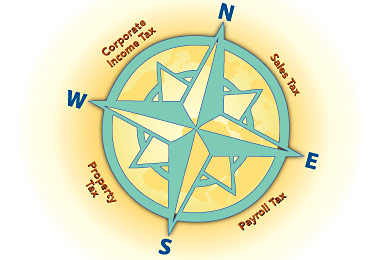When Taxes Affect Industry-Specific Location Decisions
Certain industry sectors are more sensitive to specific taxes, and companies in those sectors need to know what to avoid.
March 2011

It is standard practice for business location consultants to explore tax climate in every analysis. Information considered ranges from company-specific tax liability to a third-party tax environment index, depending on the specific needs of the company.
Yet, despite their large potential cost burden, taxes alone seldom dictate where a company locates. The goal of location analysis is to properly balance a multitude of factors impacting a company's operations. Normally, operation-critical attributes - like labor pool characteristics and access to customers - drive the location decision. Tax considerations join labor, utility, and transportation costs as part of the overall cost of doing business. Most of the time this method is appropriate.
However, certain industries are disproportionately sensitive to taxation based on the nature of their sales, investments, or overall operations. In these cases, increasing the weight or significance of a specific tax is appropriate when ranking locations. Let's examine specific taxes and situations that create hurdles or even eliminate locations from the site search.
Personal Property Tax
Data centers were one of few sectors to see growth during the recession. Changing means of communication, entertainment, and access to medical data all drive growth.
Communities want these projects because they attract skilled IT workers and capital investment, while creating a relatively small drain on services. Yet the massive investment in personal property that is usually involved can force site selectors to place a state's personal property tax structure at the top of a list of evaluation criteria. States are beginning to take notice. Personal property tax is assessed and collected locally, and primarily used to fund education and services. Though rates are determined locally, the existence of tax on personal property is a state-level decision. This creates vastly different tax burdens across state borders.
It can be the largest tax levied on companies with substantive investment in equipment. For data centers, the value of personal property - including servers, cooling systems, and infrastructure - is often twice the value of the building shell, which is assessed as real property. Thus the absence of personal property tax joins the list of criteria for a data center site, along with low risk of natural disasters and favorable electric rates.
A recent client, who was in a national site search for a mission-criti cal data center, selected personal property tax as a criterion in its first-level location filter. (In searches for less capital-intensive industries, overall tax climate is usually included in the first round of filtering.) The addition of this specific tax to the location assessment eliminated many locations that were otherwise suitable for the facility. Since the first filter is data-driven, the eliminated cities and states were never told that they hadn't made the cut - but other locations that survived this first filter were asked to submit information about available real estate and took a step closer to landing the project.
Savvy economic development groups now promote the statutory absence of personal property tax on data center equipment as a significant advantage over neighboring states. States including Illinois and Wisconsin have traditionally been havens for equipment-intensive industry such as manufacturing, and they apply this concept to data centers as well. Others such as Indiana have recently addressed data centers specifically, creating personal property tax exemption for data centers to level the playing field with neighboring states.
Project Announcements
La Colombe Coffee Roasters Expands Norton Shores, Michigan, Operations
02/23/2026
GRVTY Plans Tysons, Virginia, Headquarters Operations
02/23/2026
Hudson Industries Expands Appleton City, Missouri, Operations
02/23/2026
Israel-Based Katz 1899 Plans Dayton, Ohio, Manufacturing Operations
02/23/2026
Chick-fil-A Supply Plans Winter Haven, Florida, Logistics-Distribution Operations
02/17/2026
Annandale Millwork and Allied Systems Plans Newport News, Virginia, Operations
02/17/2026
Most Read
-
Top States for Doing Business in 2024: A Continued Legacy of Excellence
Q3 2024
-
Data Centers in 2025: When Power Became the Gatekeeper
Q4 2025
-
Speed Built In—The Real Differentiator for 2026 Site Selection Projects
Q1 2026
-
Preparing for the Next USMCA Shake-Up
Q4 2025
-
The New Industrial Revolution in Biotech
Q4 2025
-
Strategic Industries at the Crossroads: Defense, Aerospace, and Maritime Enter 2026
Q1 2026
-
The Skilled Trades Are Ready for a Digital Future
Q4 2025


